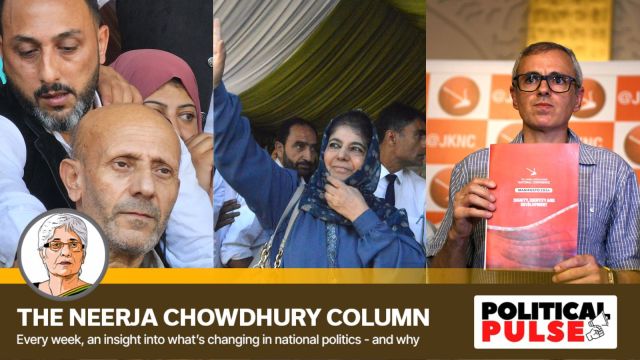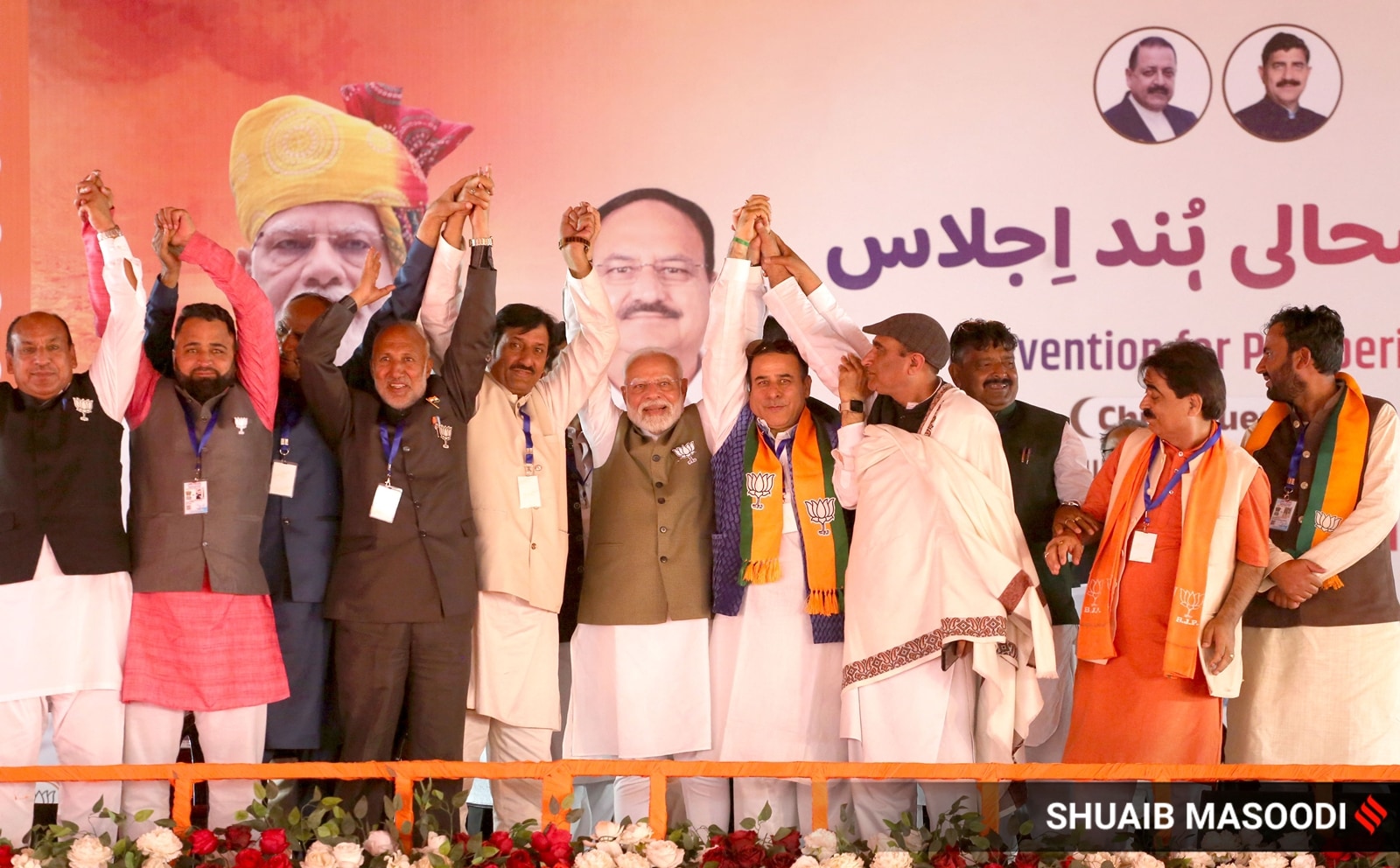© The Indian Express Pvt Ltd
Latest Comment
Post Comment
Read Comments
 (L-R) Baramulla MP Engineer Rashid; PDP chief Mehbooba Mufti and NC vice-president Omar Abdullah. (Express photos by Shuaib Masoodi)
(L-R) Baramulla MP Engineer Rashid; PDP chief Mehbooba Mufti and NC vice-president Omar Abdullah. (Express photos by Shuaib Masoodi)“I am 90 years old and have watched elections in Jammu and Kashmir since 1957 but for the first time I can’t predict even one result,” said an observer of the political scene in Srinagar. “This election has become a most crowded arena.”
Election 2024 in J&K, taking place after a gap of 10 years, has in the words of a political wag, “ended the stigma about elections” that existed in the troubled erstwhile state. If nothing else, people feel they will be able to approach their MLAs with their problems instead of having to deal with the less responsive officials.
Go to Sopore town in North Kashmir which used to be the centre of poll boycotts at one time with only 7-8 people voting in any election. Today, you see party flags and posters everywhere and 20 candidates in the fray. In nearby Handwara, People’s Conference chief Sajad Lone, once seen as a potential CM the BJP might back, is grappling with how to manage a 500-vehicle roadshow through the narrow streets of his home town, one of the two constituencies he is contesting from.
Around a month ago, many felt that the National Conference-Congress combine would sweep the UT. But as days went by, the scene got muddied with the entry of an unusually large number of independents – as many as 365 filed their nominations and, along with the smaller parties, People’s Conference, Apni Party and Awami Ittehad Party (AIP) of the recently-released-on-bail Engineer Rashid, they added up to 45% of the contestants.
 A Congress supporter at a Rahul Gandhi rally in Srinagar. (Express photo by Shuaib Masoodi)
A Congress supporter at a Rahul Gandhi rally in Srinagar. (Express photo by Shuaib Masoodi)
With the independents set to cut the NC’s votes, the ride no longer looked smooth for the National Conference-Congress duo.
Engineer Rashid was seen as the “X” factor in this election. He was expected to be the variable which would alter the course of the poll, after his runaway success in the Lok Sabha elections which he fought from behind bars, defeating Omar Abdullah by 2 lakh votes and Sajad Lone by 3.5 lakh votes. His victory was seen as a cathartic response “against New Delhi”, after the abrogation of Article 370.
But his opponents see him as a “proxy” for the BJP following his release on bail after the announcement of the elections. He has fielded 36 candidates, and is backing, among others, the 10 independents supported by the banned Jamaat-e-Islami. A large number of independents are seen as “sarkari”.
The thin and greying Rashid, who likes to call himself “a columnist, a true Muslim and a fundamentalist” and says his fight is “beyond the restoration of Article 370” – a fundamentalist to him is someone who adheres to the fundamentals of his beliefs – himself gave a hint that things might not be as good as he had hoped.
 Prime Minister Narendra Modi at a BJP rally in Srinagar. (Express photo by Shuaib Masoodi)
Prime Minister Narendra Modi at a BJP rally in Srinagar. (Express photo by Shuaib Masoodi)
“Had I got bail 10 days earlier, I would have been the most important figure in J&K today. Had I been released immediately after the Lok Sabha elections, I would have formed the (new) government.”
Asked how many seats he expected to get, he said, “I can’t say. It can be 15 or 10 or five. Ho sakta hai ek bhi naa aaye, I don’t want to mock myself by claiming something. The public can do anything.”
There are indications that the electoral waters may be muddied less by Engineer Rashid, who people say has got “exposed”, and more by what the Congress may have failed to do. This is a paradox because the party’s stock has gone up in the Valley, young people view Rahul Gandhi with renewed interest after his Bharat Jodo Yatra, his message of “mohabbat” and his unrelenting criticism of Narendra Modi.
Moving around Srinagar and in North Kashmir where polls are being held on Oct 1 in 16 constituencies (along with 24 in Jammu), I asked people what they thought of Rahul Gandhi. To my surprise, not one struck a negative note – unlike in the past when people could see the Congress doing nothing right.
“He is a good leader,“ remarked fruit sellers in Langate constituency, an Assembly segment from where Engineer Rashid’s brother is contesting. A 40-year-old salesman on a houseboat on the Dal Lake had not voted this time, nor in any election in the past – because “hum log pit hee toh rahe hain” – but gave a thumbs-up to Rahul. “Congress ne rajniti pee hui hai,” young shopkeepers at Lal Chowk, Srinagar’s main market and political centre, rooted for him.
While Rahul seems to have caught the imagination of the youth in the Kashmir Valley, the Congress has not been able to encash this goodwill. Congress leaders conceded privately that the party would be lucky to hit a double-digit tally in the state.
Expressing his displeasure with his partner, Omar Abdullah urged the Congress to get on with campaigning in Jammu. In response, Priyanka Gandhi Vadra came rushing to Jammu and addressed a meeting in Bishnah a day before the campaigning ended.
Jammu and Kashmir underscores the challenge before the Congress everywhere – while Rahul’s appeal is growing, the party organisation continues to stagnate. In a state like Haryana, where elections are due on October 5, the Congress is a front runner, because it has an organisation and a clear leadership to take advantage of the unhappiness against the 10-year BJP rule. In Kashmir, the party appointed Tariq Hameed Karra as the new party president after the elections were announced.
The final phase of polling in Jammu is critical for the BJP, which has made an all-out push to improve on its 2014 tally of 25 seats, with all its leading lights camping and campaigning there.
While Omar Abdullah is likely to be the CM on the NC-Congress side, the BJP, according to highly placed sources, will go for a Muslim – not a Hindu – face to head its government. If it emerges as the single largest party, say insiders, “it will definitely form the government”. The party could then consider someone like former Deputy CM Muzzafar Baig as CM – he left the PDP in 2019 and has drawn close to the BJP leadership, particularly after the Government gave reservation earlier this year to the Pahari community, to which he belongs. He is fighting as an independent from Baramulla, pitted against his own nephew backed by the NC, in one of the most keenly awaited outcomes.
Will the new Assembly throw up a hung House? Many expect the NC-Congress to form the next government, on their own or with help from the others. Can the NC join hands with the BJP to provide a “stable” government? Like Mufti Mohammed Sayeed did in 2014 when the PDP got 28 seats and the BJP mopped up 25, one party representing the Kashmir Valley and the other Jammu?
NC president Farooq Abdullah ruled this out categorically. His party, he told this writer, will be open to joining hands with anyone “except the BJP”.
PDP chief Mehbooba Mufti said her party would be open to supporting a secular formation, though with certain conditions. “But we can think of it, if they need us.” Sajad Lone said that he would sit “outside”. But that too would help the NC-Congress combine.
As for Engineer Rashid, he was more enigmatic. “If anyone approaches me (for help), and that includes both sides, I will put tough conditions.” Would he support the BJP? “Wait for the 8th,” he replied, “Nothing is impossible in this world.” But, “I don’t give a damn about forming the government.”
October 8 will show how the chips finally fall in Jammu and Kashmir. The significance of the 2024 battle in the UT goes beyond who wins and who loses. It lies in the restoration of the political process which enables people to express what they feel – hurt, anger, suffocation, expectation – and by so doing, end their sense of helplessness and begin to assert their power.
(Neerja Chowdhury, Contributing Editor, The Indian Express, has covered the last 11 Lok Sabha elections. She is the author of How Prime Ministers Decide)


